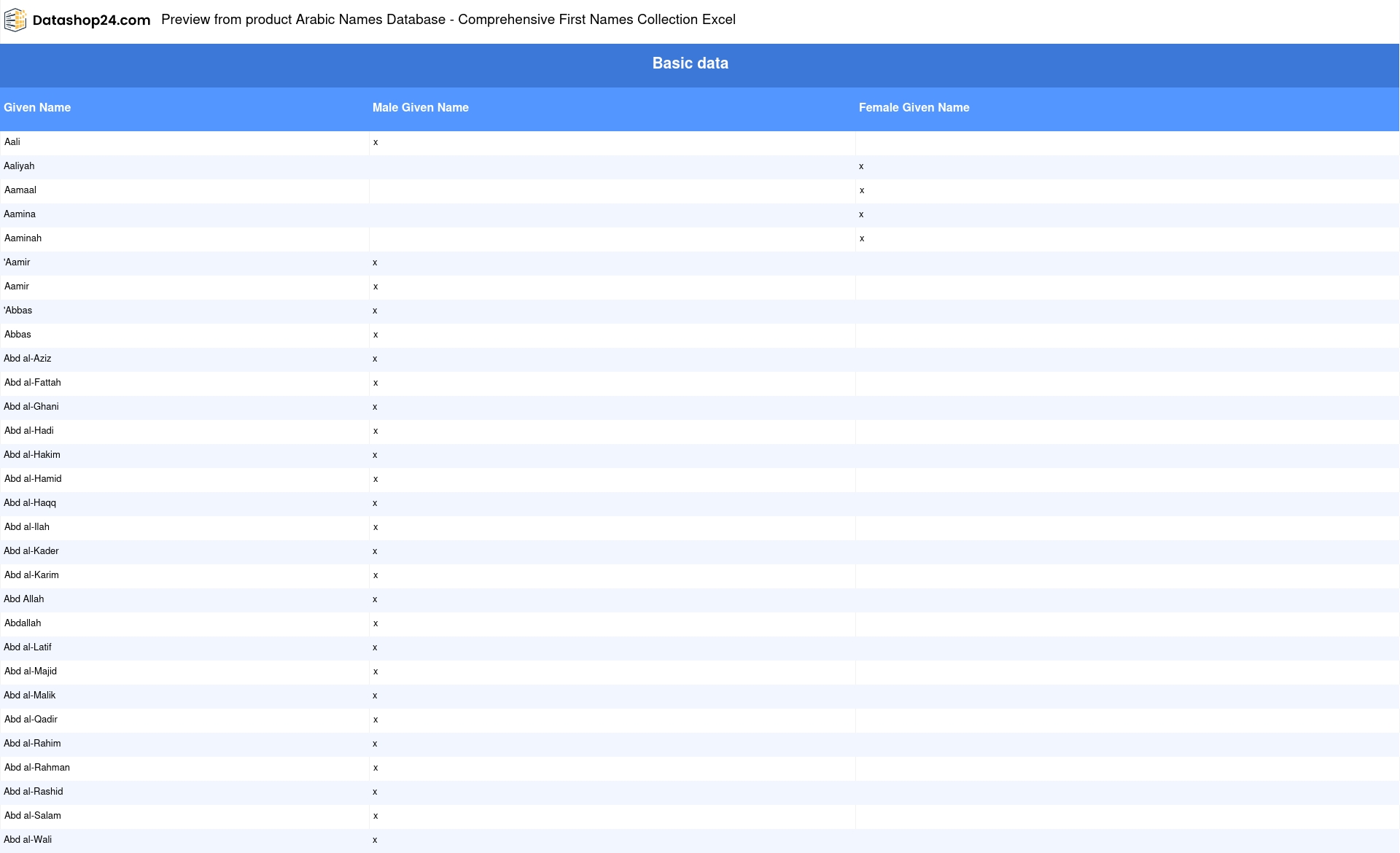Arabic Names Database - Comprehensive First Names Collection Excel
Essential Database Information for Arabic Names






 Up-to-date and carefully verified data
Up-to-date and carefully verified data Company-wide unlimited usage period
Company-wide unlimited usage period No waiting, immediate access after purchase
No waiting, immediate access after purchaseComprehensive Arabic Names Database with Gender Classification
Our Arabic names database contains 1.371 carefully curated first names from Arabic-speaking regions with precise gender classification. Each entry includes the first name and its corresponding gender designation (male, female, or unisex), providing you with essential data for various applications. The database is delivered in Excel format, making it easy to filter, sort, and integrate into CRM systems, marketing tools, or other databases. Whether you're developing software applications, conducting demographic research, or creating personalized marketing campaigns, this structured dataset offers reliable reference data for Arabic male names and Arabic female names.
The following table provides an overview of the database structure and content:
Basic data
Advantages of Purchasing Our Arabic Names Database
Acquiring a ready-made Arabic names database offers significant advantages over conducting your own research, particularly when dealing with the complexities of Arabic naming conventions and regional variations. Here are the key benefits of our professionally compiled dataset:
- Time-saving efficiency: Researching and compiling Arabic boy names and Arabic girl names from various sources can take weeks or months. Our database provides immediate access to a comprehensive collection across multiple Arabic-speaking countries and regions.
- Cultural accuracy: Arabic names follow specific linguistic patterns and cultural traditions. Our database includes authentic Arabic names that reflect proper naming conventions, Islamic heritage, and regional variations across the Arab world.
- Gender classification reliability: Determining gender classification for Arabic names requires expertise in Arabic linguistics and cultural contexts, especially for names with similar patterns or those with religious significance.
- Structured data format: The Excel format allows for immediate integration into your existing systems without additional formatting or data cleaning requirements.
- Regional representation: Our database includes Arabic names from different countries and cultural backgrounds, reflecting the diversity of naming practices across the Middle East and North Africa.
- Quality assurance: Each entry undergoes validation processes using modern algorithms and cultural verification to ensure accuracy and authenticity.
Useful Information and Frequently Asked Questions about Arabic Names
What does Al mean in Arabic names?
"Al" (???) in Arabic names typically serves as the definitive article meaning "the" in Arabic. While more commonly found in surnames or titles, it can appear in compound names or when referring to someone with a particular attribute. For example, "Al-Rashid" means "the rightly guided" or "Al-Amin" means "the trustworthy."
What are popular Arabic boy names?
Popular Arabic boy names include both traditional names with deep Islamic heritage and contemporary choices. Examples include Muhammad, Ahmed, Omar, Ali, Hassan, Khalid, and Youssef. These Arabic male names often have religious significance, honor prophets or companions, or represent positive qualities like strength, wisdom, or faith in Islamic culture.
What are popular Arabic girl names?
Popular Arabic girl names encompass beautiful names with Islamic heritage and cultural significance. Examples include Fatima, Aisha, Maryam, Zahra, Layla, Nour, and Yasmin. These Arabic female names often have meanings related to beauty, light, virtue, or honor important women in Islamic history, reflecting the rich cultural traditions of Arabic-speaking communities.
Fascinating Facts About Arabic Names
Arabic naming traditions reflect over 1,400 years of Islamic culture and linguistic evolution, creating one of the world's most meaningful naming systems. Most Arabic names carry profound significance, often describing desired qualities, honoring religious figures, or reflecting attributes of Allah mentioned in the Quran. The traditional Arabic naming pattern includes the given name, father's name (patronymic), and sometimes tribal or geographical identifiers, creating a complete genealogical record. Many Arabic names have roots in classical Arabic poetry and literature, with some names deriving from pre-Islamic Arabian culture while others emerged with the spread of Islam. Regional variations exist across the Arab world, with Maghrebi names showing Berber influences, Gulf names reflecting maritime traditions, and Levantine names incorporating historical multicultural elements. The practice of choosing names with beautiful meanings is so important that the Prophet Muhammad encouraged believers to give their children "good names." Interestingly, many Arabic names are compound names combining different elements to create unique meanings, and some names are specifically chosen based on the 99 names of Allah (Asma ul-Husna), such as Abdul-Rahman (servant of the Merciful) or Abdul-Aziz (servant of the Mighty).






 Up-to-date and carefully verified data
Up-to-date and carefully verified data Company-wide unlimited usage period
Company-wide unlimited usage period No waiting, immediate access after purchase
No waiting, immediate access after purchase







